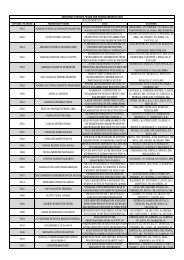immunology of infectious and parasitic diseases - XXXVII Congress ...
immunology of infectious and parasitic diseases - XXXVII Congress ...
immunology of infectious and parasitic diseases - XXXVII Congress ...
Create successful ePaper yourself
Turn your PDF publications into a flip-book with our unique Google optimized e-Paper software.
DECREASED ACTIVATION OF MONOCYTES IN PATIENTS WITH<br />
MULTIBACILLARY LEPROSY<br />
GIOVANA BERGHEME FRANCISCON 1 ; SARA PASSOS 1 ; TAIS CAMPOS 1 ;<br />
MAYUME SHIBUYA 1 ; EDGAR M. CARVALHO 1,2 ; PAULO MACHADO 1,2 AND<br />
LUCAS P. CARVALHO 1,2,3 .<br />
1 Serviço de Imunologia, Universidade Federal da Bahia; 2 Instituto de Ciência e<br />
Tecnologia – Doenças Tropicais (INCT-DT); 3 Instituto de Ciências da Saúde<br />
(ICS), Universidade Federal da Bahia.<br />
Introduction: Leprosy is a chronic granulomatous disease caused by<br />
Mycobacterium leprae, which has tropism for peripheral nerves <strong>and</strong> skin. While<br />
patients with multibacillary (MB) disease do not mount type 1 immune response<br />
facilitating the multiplication <strong>of</strong> Mycobacterium, paucibacillary (PB) individuals<br />
produce IFN-gamma in response to M. leprae antigens, what control bacteremia<br />
but causes immunopathology. Downregultion <strong>of</strong> type 1 immune response<br />
observed in MB patients may be due to decreased antigen presentation <strong>and</strong> /or<br />
co-stimulation. In the present study we aimed to evaluate the frequency <strong>and</strong><br />
degree <strong>of</strong> activation <strong>of</strong> subsets <strong>of</strong> monocyte in peripheral blood <strong>of</strong> patients with<br />
MB <strong>and</strong> PB forms <strong>of</strong> leprosy, prior <strong>and</strong> after treatment.<br />
Methods <strong>and</strong> Results: Peripheral blood mononuclear cells from MB <strong>and</strong> PB<br />
patients were obtained; frequency <strong>and</strong> degree <strong>of</strong> activation <strong>of</strong> subsets <strong>of</strong><br />
monocyte were determined ex-vivo by flow cytometry, prior <strong>and</strong> after treatment.<br />
There was no difference between frequency <strong>of</strong> monocyte subsets between MB<br />
<strong>and</strong> PB patients prior to treatment. However, analysis <strong>of</strong> co-stimulatory<br />
molecules expression in monocytes reveiled that the non-classical<br />
(CD14 dim CD16 + ) population <strong>of</strong> monocytes from MB patients had a significant<br />
decrease in CD86 expression when compared to the ones from PB individuals.<br />
CD86 expression in monocytes from MB patients was restored after<br />
polychemotherapy. To test whether Mycobacterium antigens could<br />
downregulate CD86 expression, we treated monocytes from helathy individuals<br />
with M. leprae antigens <strong>and</strong> assesed MHC class II <strong>and</strong> CD86 expression in<br />
these cells. We found IL-10-independent decrease in CD86 expression 8h after<br />
treatment with M. leprae antigens.<br />
Conclusions: These data suggest that high bacteremia observed in MB<br />
patients contribute directly to downregulation <strong>of</strong> CD86 expression in monocytes<br />
from these individuals. Future functional analysis shall be performed to test<br />
whether decrease in CD86 expression leads to low Th1 cytokines production in<br />
MB patients.<br />
Financial Support: INCT-DT <strong>and</strong> CNPq.



